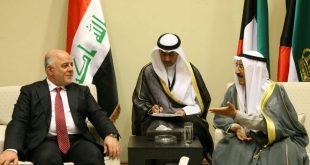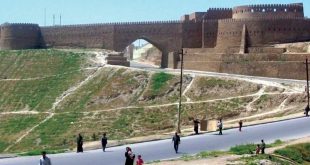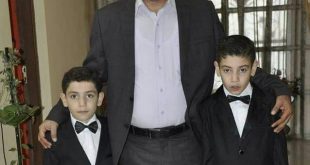On Wednesday, the 11th of this May, Baghdad witnessed a fatal security collapse, after a series of vicious terrorist bombings that targeted various areas of its neighborhoods such as the entrance of Al-Kadhimiya city, Al-Jami’a neighborhood, and Al-Sadr city – with the most violent and brutal one being the bombing that targeted a local vegetable market filled with shoppers consisting of women accompanied by their children for the most part.. this criminal bombing having ISIS’s finger prints written all over it along with their evident admission taking responsibility for it, brings us back to the bloody days witnessed by the capital several years ago.
When two elephant fight, it is the grass that suffers (an African Proverb)
The Iraqi citizen– especially the lower and weaker oppressed working classes – paid with their blood and the blood of their children the price of the security failures, political incompetence, and raging conflicts between the political factions.
The Responsibility
The security agencies and field commanders take the responsibility and blame for this dangerous deterioration that unveiled a critical error in the security procedures and Intelligence processing of the active terrorist cells threat that planned, researched, marked their clocks, planted the bombs into vehicles and relocated them to the bombing sites, and executed the attacks under the noses of the security facilities without any detection of this massive terrorist activity. And that doesn’t exempt politicians of responsibility and blame for what’s happening and the security breaches.
The Analytic reading (the first hypothesis)
ISIS used the “Dead Angles” technique, of which they sneak exploiting the security blind-spots and inadvertence, taking advantage of the distraction of the security facilities assigned to securing the capital by protecting visitors, securing protestors and pivotal locations, which requires redeployment and relocating troops from and to different governorates, which resulted into maximum depletion of the security systems’ energy and caused a state of exhaustion that increased the possibility of inattention in blind spots and exploitable loose threads in the security procedures, and this is what the enemy exploited and used in their terrorist operations. This is not a justification for what happened, and security systems can focus on the angles most prone to breaches, depending on the professionalism and expertise of the leaders and constant field follow-up with their assigned troops to maintain the capital’s security and stability. This situation reveals an obvious glitch in security planning and performance which brings us back to the necessity of an emergent reassessment of the security plans, the system of selecting leaders and commanders, and how the two things are compatible with the military and professional standers, also the necessity of researching and investigating every breach and punish negligence through the military court.
The second hypothesis
This hypothesis depends on two main points:
1. The first hypothesis is that the booby-trapped vehicle that targeted Al-Arabia Public Market in Al-Sadr city managed to breach authorities, and go through security scans and Intelligence procedures eventually reaching the market. And here begins the most important chapter of the terrorist bombing.
2. The second hypothesis begins with the arrival of the booby-trapped vehicle to the market raising the next question to the Search and investigation procedures: How was the bomber able to successfully park the vehicle inside? And how did they escape the eyes of the owners of nearby shops and garages whom are used to checking suspicious vehicles and stranger faces and their general paranoid and investigative nature imposed by previous terrorist incidents that made paranoia a known convention in the market and the whole area without discomforting any habitué,? which raises various question marks and common sense facts; the most important being the primary clues pointing out that the bomber is a known person, and the proof of that is that they managed to park in a very sensitive area inside the market and leave the vehicle without questioning from any one, which in turn, pops another question which is, if this bomber is known, don’t they fear being identified later on? Answering that would be by assuming that the operation is well studied and depended on the technical fact that the bombing’s diameter of 150 meter would be lethal for anyone within range. And as for the ones within 300 meters, they sustained various injuries. This indicates that the betting was on the demise of any witnesses within the bombing area and surroundings, leading to a getaway for the criminal terrorist who eased, helped, and supported the bombing and hiding out of sight.
Were the bombings a surprise?
In the recent events, Isis suffered from operational defeats and setbacks, and it was a possibility that they would react in the form of counter-attacks at the war fronts and commit large terrorist attacks inside cities, aiming to achieve the following:
1. Reducing the pressure from the fronts facing critical military situations.
2. Distracting the Intelligent away from their target, swaying the course of information and confusing their facts.
3. Occupying the additional military troop deployments by creating new security challenges.
4. Reinforcing the spirit of their critically injured forces.
5. Moving the battle into secure city locations.
6. Inflecting mass loses to civilians to increase the tension and stress on the streets.
What’s happening now in operating sectors and cities confirms our predictions of events and their possibilities to be true, and we conclude that from the attacks of Tel Eskof north-west of Nineveh, the villages neighboring Al-Qayyarah, Qasabet Al-Basheer west of Kirkuk, the clashes in Makhoul, the attack on Balad, what’s happening west of the country – especially at Al-Karma, Amiriyah Fallujah, and Anbar northwest –, plus the bombings of Samawah city and what Baghdad had witnessed in the bloody Wednesday event and Thursday’s attack on Abu Ghraib police station, and lastly Sunday’s attack on Al-Taji gas lab. Here we stop at an important point that tells us that the terrorist attacks weren’t unexpected, and as a possibility, were very likely to happen in this vicious Iraqi war against ISIS.
The security agencies need to reconsider the plans and methods that proved their failure protecting civilians from the terrorist attacks and countering this dangerous security threat they’re facing, and learn from these terrorist operations and what followed them from security breaches that frightened the Iraqi people and wounded their hearts and hurt souls.
Check Also
Shocking crime… and confusing handling…!!! By the Advisor Dheyaa Alwakel
Tweet The murder of Colonel Bashir Al-Hamdani, director of the Air Force Club, and his ...
 Dheyaa Alwakeel
Dheyaa Alwakeel


